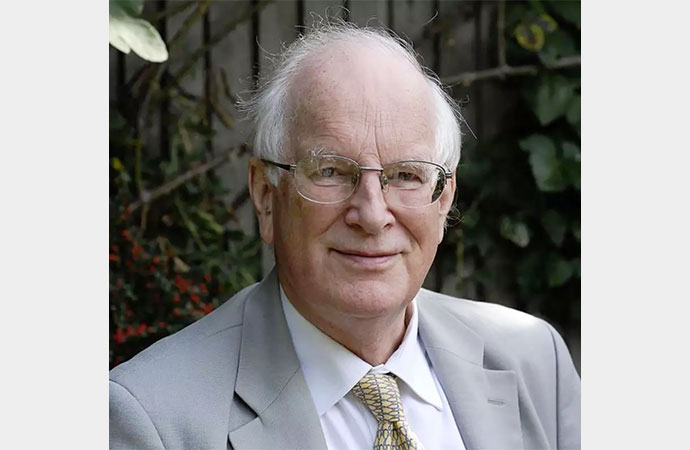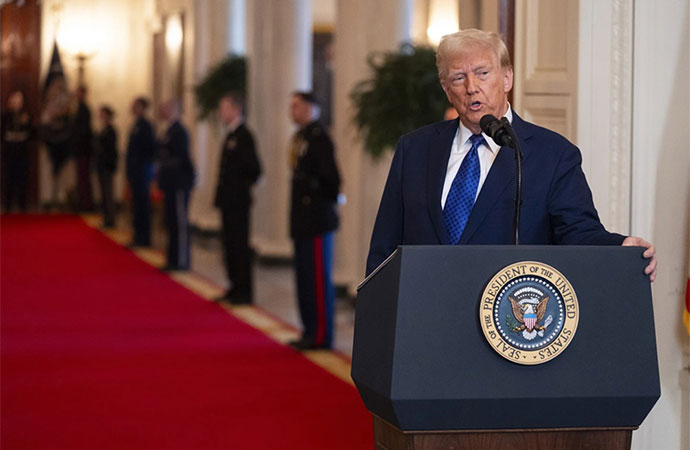Column

David Page. Photo: Collected
Our old friend from the BBC, David Page passed away this October and I came to know only this week from the letter of another senior friend, William Crawley. Both are old South Asia hands. These are the people that made the global brand that BBC once was, the most credible news distributor in the world. Now one star of that cosmos has fallen.
It's not just the person who has passed on but global news media as well. It's not just Bangladesh but the western world is in decline. News is no longer about facts but a host of tools serving many other agenda.
I am so glad I belonged to the era when news making didn't include political posturing and media workers were happy servings as conduits of information not regime change or global politics influencing.
David's last Page
David Page died at the mature age of eighty years and till his all but final days was working away as a journalist and author apart from his work with Afghan Aid. I last had contact with him a couple of years ago when he interviewed me on Zoom for his work on the state of the media in the South.
Life is frantically busy for people like us and we lost touch with the BBC network. It was revived when I was requested to write a piece for a media journal in the UK recently and the BBC contacts revived of sorts. The article was liked by several think tanks and senior journo and one was William Crawley.
William and David, both senior South Asia hands and I were part of a team that produced the first in-depth book on the emerging satellite media world in South Asia titled "Satellites over south asia and published by Sage books. Its William who informed me and with pangs of regret and deep sadness I checked the digital obituaries section of the internet. As if I could say a sort of a goodbye after he had passed on.
Book Collaboration
David, William and a host of BBC connected journos all got together and worked on the book in the 2000 as sky media or the new media began to make its presence felt all over. The contributors were almost all practicing journalists with some BBC link or other and we worked on our local satellite media scene but regularly exchanged notes on the South Asian scenario regularly.
David (Page) and William (Crawley) were of course the team leaders and working together as part of a great team was a great experience. We met in Chennai once and that led to making new friends as well which made the work all the more fun. I remember my newly made friend Nupur Bose took me to her home in Bangalore where I met more people and tasted the life of a city that represented so much of a newly emerging techno driven India.
Nupur later made the film "Michael Jackson comes to Manikganj" based on the changing media scene in Bangladesh and visited Dhaka to do the same.
The book was a big success as it was the first in-depth look at the changing media scene and received very positive attention wherever there was interest in South Asian media.
At Oxford, over a glass of Guinness
The last time we met face to face was in 2002 when I was a short term Fellow at the Centre for Forced Migration which is attached to the Queen Elizabeth House at Oxford University. I didn't find my stay there very interesting but met several old BBC friends including David Page. He was very happy that I was at Oxford, his own alma mater and we at sat and shared a big fat glass of beverage at the oldest pub in the University area.
It was a fascinating joint with its "dumb waiter" bringing up food and drinks from the basement and a crowd of young students mixing with ancient academics. David treated me to a glass of Guinness, more of a meal than a drink I felt but a libation full of history. We talked happily over the past and the present including his interest in history. He had driven down from London just to meet me and I was deeply touched. That was the last time we both shook hands and he bade me well and drove off.
That generation of journalists
If one were to read his CV, it's natural to wonder if he was a journalist or an academic. He was a brilliant first class from Oxford, a ph.d on Punjab in 1947 and authored a host of other academic and popular books. But for his generation of journalists particularly at the BBC, this was common. To them media and academic work was not about exclusion but extending the boundaries of the knowledge making process and sharing it with others. In media work this was possible and David and others did that. That made his generation of journalists so special.
So it's time to say farewell, David. More good times await for us all. Cheers
Bio note of Dr. David Page
M. David Page (19 March 1944 - 10 October 2024) was a British journalist, historian, media expert, academic, educator, author and policy researcher. Page graduated from Merton College, Oxford in 1966, with a first class degree in Modern History. He spent 1966-67 working as a lecturer at Edwardes College Peshawar in the North West Frontier Province in Peshawar.[5] In Peshawar, he had ample time to write a book titled Page by Page, addressing the key challenges local students had to confront when learning English as a second language. He then pursued a Doctorate of Philosophy at the University of Oxford, as a Harmsworth Senior Scholar at Merton College, Oxford. His D.Phil., awarded in 1975 for research about the partition of India, led to his book titled "Prelude to Partition" the Indian Muslims and the Imperial System of Control, 1920-1932, published by Oxford University Press in 1982.
He joined the British Broadcasting Corporation in 1972 as the Coordinating Programme Organiser of the BBC Urdu. He later served as the Editor of the BBC Urdu Service between 1977 and 1985. He also worked as an editor in the BBC's first ever Afghanistan Pashto-language service in 1981 and he also assisted in forming the BBC Pashto Service during its formative years.
In 1994, following a major revamp and overhaul in terms of the operational workflow of the South Asian services, he decided to part ways with BBC. He continued to explore and research Asian related topics and interest even after his departure from the BBC's South Asian services.] He was known for his collaboration with Sri Lankan lawyer Kishali Pinto-Jayawardena for the publication of Embattled Media: Democracy, Governance and Reform in Sri Lanka and the book showcased a firm onus on the aspect of improvising freedom of speech and media freedom with an in-depth analysis covering the Sri Lankan context. The Embattled Media book was considered to be an highly influential piece, as it covered the thought process about the series of obstacles Sri Lankan media industry has undergone to establish a Right to Information Act in order to exercise the fundamental rights of free speech.
He also co-authored a book along with his BBC colleague William Crawley titled Satellites over South Asia: Broadcasting, Culture and Public Interest which was published by Sage in 2000.[6] The book Satellites over South Asia: Broadcasting, Culture and Public Interest, was based on a pilot project which came to fruition with the collaboration of many researchers and journalists in South Asia.
His policy research and consultancy solutions for media law impacted the transparency levels of journalism in India, Pakistan, Bangladesh, and Sri Lanka. He also rendered his services for the board of trustees of Afghan Aid.[6] He was a senior fellow of the Institute for Commonwealth Studies. He was a prominent figure during his stint at the Commonwealth Journalists Association.
Page died in London on 10 October 2024, after sustaining complications related to his heart. He was 80. (Wikipedia )

























Leave a Comment
Recent Posts
Right On Schedule
The most eagerly anticipated, and frankly hyped up, announcement of an ...
Fighting raged along the borde ...
Fighting raged along the border of Cambodia and Thailand, with explosi ...
ICIMOD drives regional cooperation to inspire new mo ..
The Cage of Captivity and the Cry for Freedom: A Cru ..
Why Japan issued an advisory for a possible megaquak ..
The Autocrats’ War on Universities